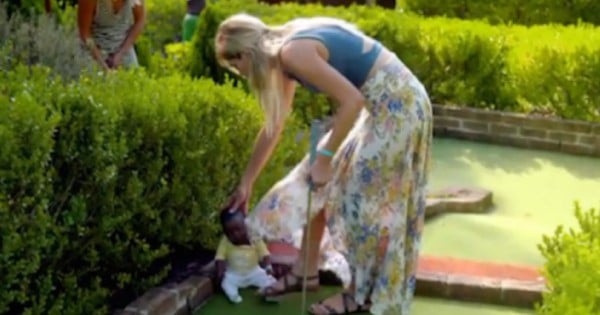Caring for a pretend baby does nothing to prevent teenagers from falling pregnant and it may even make them more likely to have a baby.
The pregnancy prevention programme is so popular that contestants on The Bachelor Australia recently tried it out on a group date – but they may need to be careful now, as it seems the experience may encourage pregnancies.

A robot baby on The Bachelor Australia. Image via Channel Ten.
Students on the education course care for a doll that cries when it needs to be fed, burped, rocked or changed. The infant simulator can then report on mishandling, crying time, the number of changes and general care.
But according to a new Telethon Kids Institute study, the programme designed to reduce teen pregnancies has backfired.
Almost 3,000 students, aged 13-15, were split into two groups and their fertility was tracked until they were 20-years-old.
The girls who were enrolled on the simulated baby programme, and cared for a fake baby at home, had higher rates of pregnancy and abortion.


Top Comments
I'd just take out the batteries and sleep in bliss - I'm a problem solver.
You can't. A special key is required which is kept by the staff. If a doll is tampered with, you have to pay for it.
I did not know that, thanks Kate B. Bribery was my next option :o)
All jokes aside, I see the point.
Maybe the fake babies need to be more realistic. Give them one which projectile vomits, or has midnight poo explosions. Or a toddler size one, teething, that dribbles over everything in sight, and then chews on anything in reaching distance, no matter how inedible it is. Or a two-year-old version, which can throw an epic tantrum in the middle of the supermarket. Make it all a little more real!